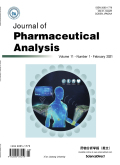首页|期刊导航|药物分析学报(英文)|Ginsenoside Rk3 modulates gut microbiota and regulates immune response of group 3 innate lymphoid cells to against colorectal tumorigenesis
药物分析学报(英文)2024,Vol.14Issue(2):259-275,17.DOI:10.1016/j.jpha.2023.09.010
Ginsenoside Rk3 modulates gut microbiota and regulates immune response of group 3 innate lymphoid cells to against colorectal tumorigenesis
Ginsenoside Rk3 modulates gut microbiota and regulates immune response of group 3 innate lymphoid cells to against colorectal tumorigenesis
摘要
关键词
Colorectal cancer/Ginsenoside/Immune cells/Gut microbiotaKey words
Colorectal cancer/Ginsenoside/Immune cells/Gut microbiota引用本文复制引用
Xue Bai,Rongzhan Fu,Yannan Liu,Jianjun Deng,Qiang Fei,Zhiguang Duan,Chenhui Zhu,Daidi Fan..Ginsenoside Rk3 modulates gut microbiota and regulates immune response of group 3 innate lymphoid cells to against colorectal tumorigenesis[J].药物分析学报(英文),2024,14(2):259-275,17.基金项目
This work was supported by the National Key Research and Development Program,China(Grant Nos.:2021YFC2101500 and 2021YFC2103900),the National Natural Science Foundation of China(Grant Nos.:22278335 and 21978236),and the Natural Science Basic Research Program of Shaanxi,China(Grant No.:2023-JC-JQ-17). (Grant Nos.:2021YFC2101500 and 2021YFC2103900)

